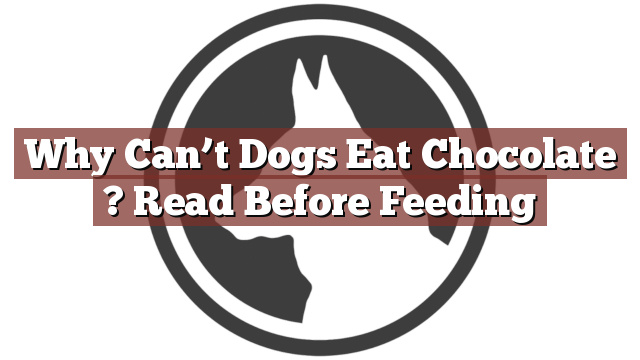Understanding Your Dog’s Dietary Needs
As a responsible pet owner, it is crucial to understand the dietary needs of your furry friend. While dogs can eat a variety of foods, there are certain items that should be strictly avoided. Chocolate is one such food that can be extremely harmful to your dog if consumed. It is essential to know the reasons behind this restriction and take necessary precautions to keep your pet safe.
Why Can’t Dogs Eat Chocolate? Read Before Feeding
Can dogs eat chocolate? The answer is a resounding NO. Chocolate, especially the dark and unsweetened varieties, contains an ingredient called theobromine, which is toxic to dogs. Unlike humans, dogs metabolize theobromine at a much slower rate, making it difficult for their bodies to process and eliminate the substance. This can lead to a build-up of theobromine, causing various health issues.
When a dog ingests chocolate, it can lead to symptoms such as restlessness, increased heart rate, excessive panting, vomiting, diarrhea, muscle tremors, and even seizures. In severe cases, chocolate poisoning can be fatal for dogs. The level of toxicity depends on the type and amount of chocolate consumed, as well as the size and overall health of the dog. Thus, it is essential to keep all chocolate products out of your dog’s reach and avoid feeding them any chocolate treats.
Pros and Cons of Feeding Chocolate to Your Dog
While it is evident that the cons of feeding chocolate to your dog far outweigh any potential pros, it is worth mentioning why dogs may be attracted to chocolate in the first place. Chocolate contains substances that can stimulate a dog’s taste buds, making it appealing to them. However, indulging their cravings can lead to dire consequences.
On the positive side, there are various dog-friendly alternatives available in the market that mimic the taste of chocolate. These treats are specifically made without theobromine and other harmful ingredients, ensuring your dog’s safety while satisfying their taste buds.
Conclusion: Keep Your Dog Safe, Avoid Chocolate
In conclusion, it is crucial to prioritize your dog’s well-being and avoid feeding them chocolate under any circumstances. Remember, even a small amount of chocolate can have severe consequences for your furry companion. Be vigilant and keep all chocolate products safely stored away from your curious pup’s reach. If you suspect that your dog has consumed chocolate, it is vital to seek immediate veterinary care. By understanding your dog’s dietary needs and making informed choices, you can ensure their safety and provide them with a long and healthy life.
Thank you for taking the time to read through our exploration of [page_title]. As every dog lover knows, our furry friends have unique dietary needs and responses, often varying from one canine to another. This is why it's paramount to approach any changes in their diet with caution and knowledge.
Before introducing any new treats or making alterations to your dog's diet based on our insights, it's crucial to consult with a veterinarian about [page_title]. Their expertise ensures that the choices you make are well-suited to your particular pet's health and well-being.
Even seemingly harmless foods can sometimes lead to allergic reactions or digestive issues, which is why monitoring your dog after introducing any new food item is essential.
The content provided here on [page_title] is crafted with care, thorough research, and a genuine love for dogs. Nevertheless, it serves as a general guideline and should not be considered a substitute for professional veterinary advice.
Always prioritize the expert insights of your veterinarian, and remember that the health and happiness of your furry companion come first.
May your journey with your pet continue to be filled with joy, love, and safe culinary adventures. Happy reading, and even happier snacking for your canine friend!

